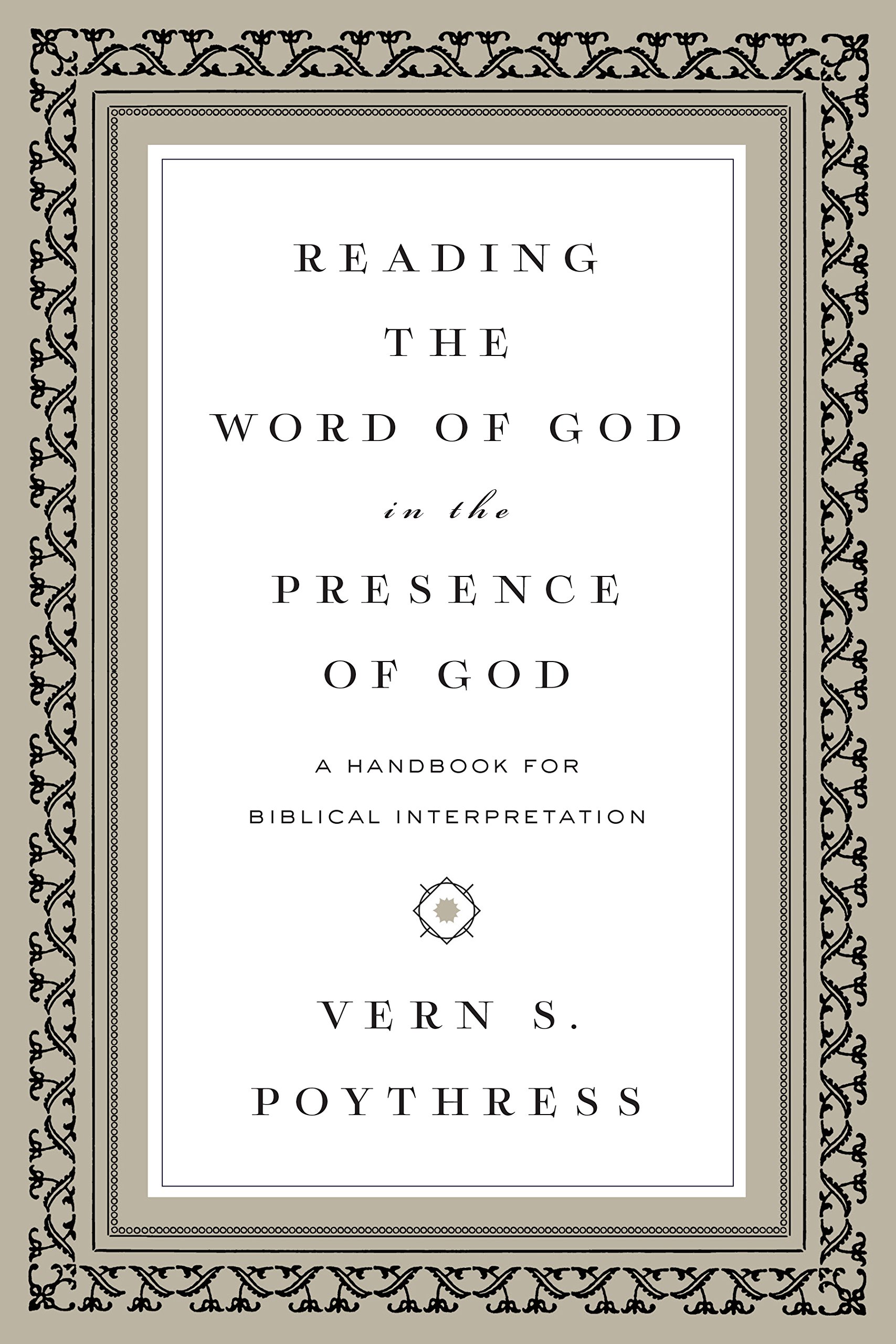Reviewed by Andrew Spencer
Introduction
Vern Poythress is deep into his academic career and he seems to be hitting a peak in productivity. In one of his recent books, Reading the Word of God in the Presence of God: A Handbook for Biblical Interpretation, Poythress takes readers beyond basic hermeneutics into the worshipful delight of meeting God in Scripture.
Appropriate for a handbook, the chapters are short and focused on small segments of information. The book is divided into thirty-five chapters, plus a conclusion. These chapters are organized in eight parts, which provide the outline for this review.
Summary
The first two parts of the volume are suitable for novice interpreters. In Part One, Poythress begins by laying groundwork for a basic, Reformed vision for Scripture, based on a pre-Enlightenment view of Scripture. Poythress offers a tri-perspectival approach to Scripture, continuing the worldview he and John Frame has made popular. Being a work intended to support faithful Bible reading, Poythress outlines his intention to approach interpretation with the view to gaining present-day applications from it. Part Two outlines three steps for biblical interpretation. Poythress demonstrates the efficacy of interrogating Scripture using three basic questions: 1) What does it say? 2) What does it mean? and 3) What does it mean to me? These queries are perspectives that assist the reader in gaining the main thrust of Scripture.
After the more basic topics, Poythress wades into deeper waters of Biblical interpretation. Even more complex subjects are presented in a manner that is sufficiently clear for the average layperson to understand. However, the content is directed toward more advanced Bible students, answering questions that technical commentaries often raise. In Part Three, Poythress addresses the chronological questions of Scripture dealing with the transmission of the text and how the modern reader should evaluate the original context and means of communication. Part Four deals with the human and divine authorships of Scripture and the need to focus on the divine authorship to prevent becoming mired in controversies over human biases.
In Part Five, Poythress wrestles with the question of language, which is a topic that he has dealt with in greater detail elsewhere. These chapters discuss basic linguistics, questions of meaning, genre, and the use of commentaries in Bible study. Part Six moves into an exposition of Redemptive-Historical Interpretation, which Poythress promotes. This section provides a summary description of several shades of the Redemptive-Historical movement, such as typological readings, and Christocentric readings. Part Seven focuses on the different methods of Redemptive-Historical interpretation as applied to the study of the Old Testament. After critique several of these methods, Poythress proposes what he calls the Fullfillment Approach, which looks for ways in which the Old Testament has been fulfilled in Christ. This section closes with a discussion of boundaries for interpretation.
The book closes in Part Eight with three chapters and a brief conclusion. In each chapter, Poythress applies his hermeneutics to a separate Old Testament passage: Proverbs 10:1, Psalm 4:8, and Amos 1:3. The conclusion is a call to engage intellectually in the study of Scripture as an act of love toward God; this is a suitable doxology for a volume designed to inspire interpreters to love. Poythress also includes five essays on various aspects of interpretation, meaning, and hermeneutics as appendices. These would not fit in the main body of the text, but are helpful contributions to a holistic understanding of Bible study.
Evaluation
Reading the Word of God in the Presence of God would make a useful text for teaching hermeneutics or a course in biblical exegesis. Although they lack the satisfying flow of a less functional text, the short chapters are conducive to varied segmentation and review. As such, this is the sort of book that could be incorporated into a training program in the local church or in college or seminary courses in semester or compressed formats.
Poythress is very thorough in his explanations. More experienced exegetes may find some sections a bit repetitive. However, this makes the volume ideal as a way to expand the horizons of the new student or for a group to work through at irregular intervals. It also increases the functionality of the book as a reference. In short, there are limitations native to this text due to the nature of a handbook, but these function as strengths in some circumstances.
This book is a gift to the church. It is practical and flexible for use by a variety of interest and skill levels. It would be good for the Sunday School teacher or the young pastor. Most significantly, Poythress focuses his readers on the reality that studying the Bible is not mainly for gaining knowledge. Instead, Bible study should flow from a deep love for God and should help the student love God more deeply. Whether in lesson creation, sermon preparation, or exegetical research, the student of the Bible should delight in the vibrant truth that he or she is handling the very words of God.
Andrew Spencer serves as Director of Assessment and Institutional Research at Oklahoma Baptist University. He is also a PhD candidate in Christian Ethics at Southeastern Baptist Theological Seminary.
